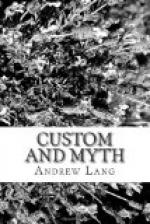Here then, in widely distant regions, in early European, American, Melanesian, African societies, we find those factors in religion which the primitive Aryans are said to have dispensed with, helping to construct society, rank, property. Is it necessary to add that the ancestral spirits still ‘rule the present from the past,’ and demand sacrifice, and speak to ‘him who dreams,’ who, therefore, is a strong force in society, if not a chief? Mr. Herbert Spencer, Mr. Tylor, M. Fustel de Coulanges, a dozen others, have made all this matter of common notoriety. As Hearne the traveller says about the Copper River Indians, ’it is almost necessary that they who rule them should profess something a little supernatural to enable them to deal with the people.’ The few examples we have given show how widely, and among what untutored races, the need is felt. The rudimentary government of early peoples requires, and, by aid of dreams, necromancy, ‘medicine’ (i.e. fetiches), tapu, and so forth, obtains, a supernatural sanction.
Where is the supernatural sanction that consecrated the chiefs of a race which woke to the sense of the existence of infinite beings, in face of trees, rivers, the dawn, the sun, and had none of the so-called late and corrupt fetichism that does such useful social work?
To the student of other early societies, Mr. Muller’s theory of the growth of Aryan religion seems to leave society without cement, and without the most necessary sanctions. One man is as good as another, before a tree, a river, a hill. The savage organisers of other societies found out fetiches and ghosts that were ‘respecters of persons.’ Zoolatry is intertwisted with the earliest and most widespread law of prohibited degrees. How did the Hindoos dispense with the aid of these superstitions? Well, they did not quite dispense with them. Mr. Max Muller remarks, almost on his last page (376), that ’in India also . . . the thoughts and feelings about those whom death had separated from us for a




